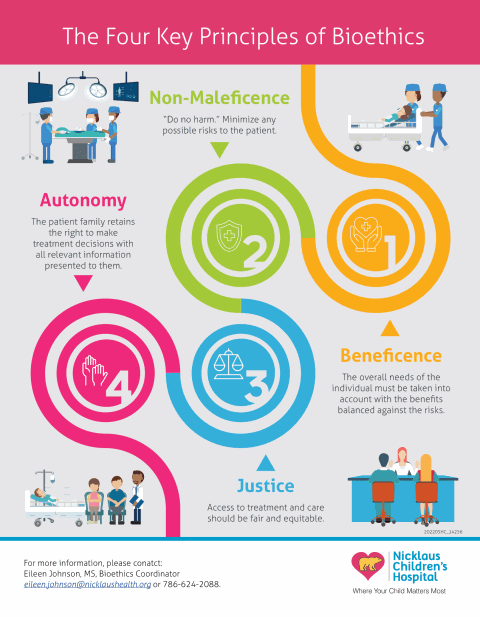When a child is hospitalized, decisions must be made regarding approaches to care. These decisions are made by a group of people, including the patient, his or her family, physicians, and other healthcare providers. However, making a collective decision about what is best for the child can sometimes be difficult.
The Bioethics Program at Nicklaus Children's Hospital has a committee that serves as a resource and an advisory group to help with difficult care-related decisions.
Services Offered
- Ethics Consultations
- Policy Development and Revisions
- Ethics Education
What is Bioethics?
Bioethics is the study of ethics within medicine, science, and research. We strive to provide the best bioethics services needed for complex medical cases, providing clarity and support. Bioethics provides a framework for navigating difficult and morally distressing cases.
This framework is based on four central principles:
- Respect for Autonomy: The patient retains the right to make their own decisions regarding their care when they have been provided with all relevant information.
- Beneficence: That the treatment and care is in the best interests of the patient, taking the overall needs of the individual into account,
- Non-Maleficence: “Do no harm.” Minimize any possible risk to the patient. Do not provide treatment where there is risk of harm or no benefit.
- Justice: Fairness. Spreading benefits and risks equally and without bias or discrimination.
Any violation of the above principles results in an ethical issue that must be addressed. Nicklaus’ Bioethics Program serves to maintain these principles and provide resources for employees and families to help navigate complex cases where ethical issues may arise.

Bioethics Committee
Nicklaus Children's Hospital acting as the child’s advocate, has a Bioethics Committee that serves as a resource and as an advisory group to help with difficult care-related decisions. Any parent, family member, or healthcare provider may request a meeting with the Bioethics Committee to receive advice or counsel.
The Bioethics Committee membership may represent and include:
- Parents
- Residents of the surrounding community
- Community- and hospital-based physicians
- Social workers
- Clergy
- Biomedical ethicists
- Nurses
- Hospital employees
- Hospital administrators